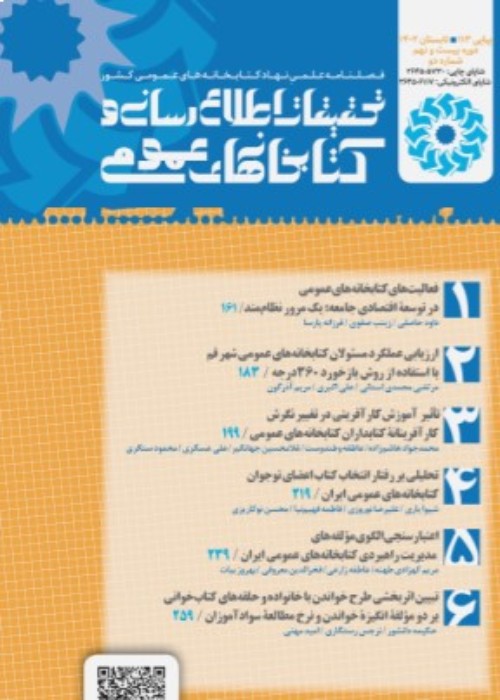The Reading Crisis in Iran (During the 1960s and 1970s): A Critical Discourse Analysis
Reading is one of the challenging problems in contemporary Iran. After the Persian Constitutional Revolution (1905-1911), reading becomes one of the factors that Iranians considered it necessary for modernization and development. For this reason, most people, even who were literate, had no desire to read. This situation was unpleasant for intellectuals, publishers and cultural activists, and therefore they published essays and articles about this issue. These publications grew significantly during the 1960-1970s. As we can see in these documents, the main idea was that Iran society has encountered by a "Reading Crisis". This study aims to describe this idea under the Reading Crisis discourse. Moreover, it seeks to show how the articulation of this discourse was affected by discursive practices and social practices.
The methodology used in the present research is the Faircloughchr('39')s critical discourse analysis (CDA). Based on this method, First, the articles about reading which were published from 1905 to 1978 were searched and categorized into discourses and then those documents were chosen that were tagged as “reading crisis discourse” (45 texts). These documents were then coded during the next two stages: first, each fragment of the texts was tagged by one or more elements of Faircloughchr('39')s CDA model (433 fragments); then, similar text fragments were categorized and tagged. The coding process continued until sufficient data to describe all the selected discoursive components were collected, and the present researchers were able to find a logical relationship between the data.
The findings indicate that publishers are the main speakers of this discourse. As for-profit institutions, they seek more profit, but in order to gain legitimacy, they use cultural language and try to show Iranian society has a big problem and people do not read enough. They call this a crisis and claim that government must intervene and facilitate buying books by subsidies. They say that government must pay subsidies to publishers as a way to reduce book price. On the other hand, government seek a way to eliminate the voice of the protesters or voices that did not match the main discourse and central power and thus to censor books. As a result, government grants privileges to publishers, provided that they publish good books. During the time, most publishers became the collaborators of government in censorship in order to safeguard their interests. In this discourse, the reader is for the most part represented as the buyer, and reading is roughly equivalent to buying. Book, as the main media of discourse, is divided into two groups: bad books and good books: good books are ones supporting the governmentchr('39')s idea of development and modernization. Censorship mechanism is the gatekeeper of bad books; and public libraries, “Institute for the Intellectual Development of Children and Young Adults” and “Childrenchr('39')s Book Council” are promoters of good books.
The book crisis discourse in Iran is still alive and powerful. By knowing the origins and mechanism of this discourse, reading promoters and other social actors avoid mistakes that may damage their valuable efforts.
- حق عضویت دریافتی صرف حمایت از نشریات عضو و نگهداری، تکمیل و توسعه مگیران میشود.
- پرداخت حق اشتراک و دانلود مقالات اجازه بازنشر آن در سایر رسانههای چاپی و دیجیتال را به کاربر نمیدهد.




